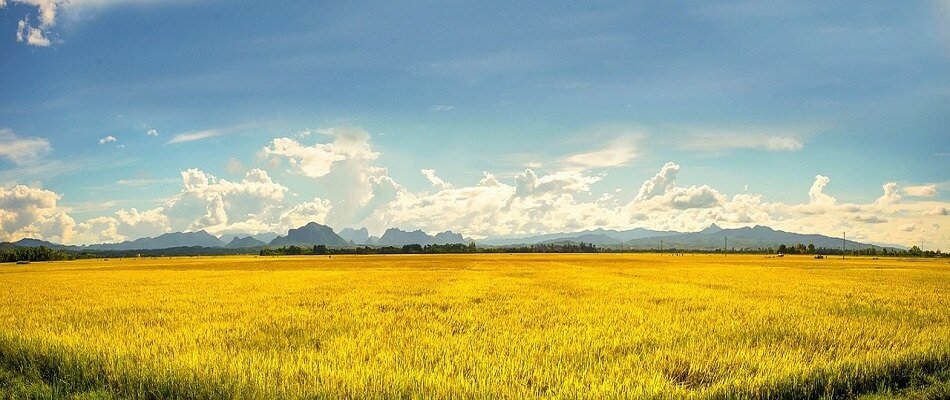Farmers in India are harvesting the largest rice crop in history, which promises record exports, while also ensuring the continuation of their longest-running protest, which will turn a year old next month.
The sit-down is taking place in the capital, miles away from the five acres (2 hectares) of lush green rice paddies tended by Sukrampal Beniwal in his village of Munak, in the northern state of Haryana.
Also Read: ‘Mechanised farming’ is mantra for higher productivity but farmworkers?
Repeal the laws
‘We will not budge until the government repeals the laws,’ he said, referring to three measures that farmers protesting in New Delhi by the tens of thousands say will jeopardize their livelihoods.
Farmers in the breadbasket state have banded together to harvest the massive crop and ensure that every time a group leaves to harvest rice, a similar number leaves to join the protest on the outskirts of New Delhi, according to Beniwal.
‘Because of our camaraderie, we have dealt with the two competing challenges quite successfully: managing the protest against farm bill and harvesting a large crop,’ he added.
The farm bill, which was introduced in September of last year, deregulates the agriculture sector, allowing farmers to sell produce to importers outside of government-regulated wholesale markets, where growers are guaranteed a minimum price.
While small farmers argue that the changes make them more vulnerable to big business competition and threaten the eventual loss of price support, the government claims that the reforms will provide them with new opportunities and better prices.
However, with global food prices nearing decade highs following a 30 percent increase in cereal rates over the last year, India’s problem of plenty also presents a dazzling opportunity.
According to traders, the new harvest will boost exports and help South Asia cement its position as the world’s leading supplier of the most critical grain.
Indian rice export prices appealing
‘Indian prices are very appealing at a time when demand from many importers, including China and a slew of African countries,’ said Aditya Garg, a leading grain exporter.
‘In reality, many Indian exporters have got orders from a large number of new importers in Egypt, Sudan, Tanzania, and Iran for non-basmati rice.’
Coming at a time when output in traditional export powerhouses Vietnam and Thailand is flat, the increased supply will allow New Delhi to offer more competitive rates, undercutting any competitors.
Summer-sown rice output will reach a record 107.04 million tonnes in 2021-22, according to the farm ministry, while the combined output of summer and winter rice will reach 125 million, or about 24.5 percent of global rice output, the highest ever.
With upgraded export facilities, that volume will allow India to match, if not exceed, last year’s record export tally of 20 million tonnes, meeting the rising demand for the staple from importers in Asia, Africa, and the Middle East.
According to dealers, India is selling 25% broken rice, a non-basmati variety preferred by most overseas importers, at $345 per tonne on a free-on-board (FOB) basis, compared to $360 offered by Thailand, the world’s second-largest rice exporter, with some cargoes even sold at $320 per tonne.
Change it up
Farming employs nearly half of India’s nearly 1.4 billion people and accounts for roughly 15% of the country’s $2.7 trillion economy.
According to government figures, rice is India’s most valuable foreign exchange earning farm commodity, with shipments totaling $8.82 billion in the fiscal year that ended in March 2021. Until two seasons ago, India’s annual rice exports ranged between 11 and 12 million tonnes.
However, shipments increased to 20 million tonnes last season, representing a record share of 40.7 percent of global trade, according to U.S. Department of Agriculture (USDA) data, as growing problems in Southeast Asia drove up rival prices, making Indian non-basmati shipments appealing to hungry global importers.
‘As climatic conditions aided our farmers in increasing the country’s rice production, we’ve permanently become an even bigger player in the international market, and our share will grow,’ said Unicorp Pvt Ltd trader Rajesh Paharia Jain.
Also Read: Kisan Mahapanchayats and AIKS to amplify protest against Farm Laws
The rice farmers in Munak, 130 kilometers (80 miles) from New Delhi, showed no signs of giving up. ‘Our record crop demonstrates that we are making India more than self-sufficient in food,’ said rice grower Ravindra Kajal. ‘The government should not insist on laws that will spell doom for agriculture.’


















Add Comment